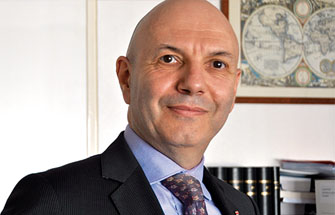AMAF (Association Monégasque des Activités Financières – Monegasque Association of Financial Activities) welcomed Mr Laurent Anselmi, Director of Judicial Services, for a lunch conference on financial crime on 6 November.
After highlighting the difficulty of defining the boundaries of financial crime (international capital movements, misappropriation of funds, tendering infringements etc.), Mr. Anselmi stressed the variable nature of its purpose, as the illegal actions may be committed with a purely lucrative aim or they may constitute a means of financing a terrorist activity, for example.
He recalled that while Monaco has classical instruments for fighting financial crime, such as for fraud for example, resulting in particular from the criminal code, the past decades have seen some significant changes:
- Firstly, Prince Rainier III pursued a proactive policy to shape the public commercial law legislation, with a consistent financial and criminal aspect.
- Hence the following laws were enacted:
- the law of 8 January 1990 on mutual funds
- the law of 26 July 1991 concerning the carrying out of certain economic and legal activities
- the law of 7 July 1993 creating a money laundering offence in the criminal code and amending the criminal procedure code
- the law of 9 July 1997 relating to portfolio management and related stock market activities
- Prince Albert II then wanted to organise regulatory vigilance with regard to financial crime, by placing particular emphasis on the issue of money laundering, with a first law dated 3 August 2009 relating to combating money laundering, terrorist financing and corruption, and then a second one dated 28 June 2018, reinforcing this mechanism in the wake of the European directives. Reporting of suspicion, confidentiality of information and ‘whistleblower’ systems were thus addressed.
Mr Anselmi also noted that this legislative development has affected the country’s administrative and institutional landscape:
- on the one hand, by leading to the creation of an independent administrative authority: the Commission de Contrôle des Activités Financières (C.C.A.F.) (Control Commission of Financial Activities), responsible for supervision of the financial centre’s financial activities, which had been preceded by that of the Commission de Contrôle des Informations Nominatives (C.C.I.N.) (Commission for the Monitoring of Personal Information)
- on the other, by facilitating the emergence of a financial intelligence unit with progressively strengthened powers: the Service d’Information et de Contrôle sur les Circuits Financiers (S.I.C.C.F.I.N.) (Financial Circuits Information and Control Department), responsible for collecting, analysing and passing on to the judicial authority when appropriate, information relating to the prevention of money laundering, terrorism financing and corruption.
As for the repression of financial crime, the speaker examined the duality of the legal nature of the possible penalties, which may be administrative or criminal.
On the statistical front he stated that in Monaco 41% of criminal cases relate to economic and financial offences.
In conclusion, Mr Anselmi underlined that the continuous evolution of this type of crime justifies Monaco’s administrative and judicial authorities having the legal instruments to allow constant adaptation to illegal practices. For this purpose, he announced collaboration with the Law Faculty in Nice for detailed research on financial crime and Monegasque law.






